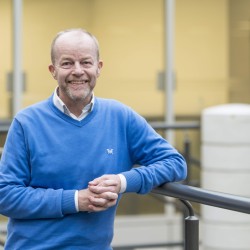
Dr Paul Pollard
About
Biography
Paul graduated from University College Dublin in 1990. He spend his early years in mixed practice in Northern Ireland, before joining the Department of Agriculture and Rural Development (DARD). He spent 4 years working at Greenmount College teaching Animal Health and Welfare to agriculture students and Veterinary Nurses.
Paul then moved into small animal practice and was the Clinical Director of a group of practices on the Isle of Wight. He gained his certificate in Veterinary Cardiology before moving to the Royal Veterinary College as the Head Vet and the rotation leader of their primary care teaching hospital in Camden. Here Paul gain a Masters in Veterinary Education. After 6 years, in January 2022, Paul joined the University of Surrey as the Director of Clinical Education.
ResearchResearch interests
Paul's research interests are in the use of feedback within the clinical setting which was the focus of his Masters in Veterinary Education.
Paul is also interested in workplace based clinical education and how students learn within the workplace
Research interests
Paul's research interests are in the use of feedback within the clinical setting which was the focus of his Masters in Veterinary Education.
Paul is also interested in workplace based clinical education and how students learn within the workplace
Publications
Within the evolving landscape of veterinary education in the United Kingdom, an increasing shift toward a distributed model of instruction necessitates that clinicians who assume the role of novice educators, receive training as clinical educators. The University of Surrey has pioneered a training program aimed at promoting understanding and application of educational theory in veterinary educator identity development. This study investigated the reflections of novice educators upon conclusion of their training to delineate the program's efficacy and identify areas of educator training necessitating further research and enhancement. A convenience sample of 53 reflective narratives was subjected to inductive thematic analysis. Three principal themes emerged. The first encapsulated an enhanced cognizance of student learning needs, underscored by foundational learning theories. Notably, the introduction of “feedforward” and the incorporation of student reflection within the feedback mechanism were identified as innovative concepts. The second theme revolved around the personal growth experienced because of participation in the training program, with 47% of reflections articulating profound introspection. The final theme explored the perceptions of the rewards and challenges associated with balancing the educational program with routine professional responsibilities, highlighting an increase in self-confidence and the obstacles encountered in allocating time for training.
Within veterinary education, there is an increasing shift toward a distributed teaching model, requiring clinicians to assume roles as novice educators. To support their development, the University of Surrey pioneered a training program focused on promoting educational theory and feedback delivery skills. This study investigates the reflections of 79 novice clinical educators on their experiences with structured feedback training, analyzed using inductive thematic analysis.
Five key themes emerged: adopting a structured feedback approach, fostering self-assessment and reflection, providing specific and constructive feedback, creating a supportive learning environment, and overcoming challenges in delivering negative feedback. Findings revealed that 99% (n = 79) of educators recognised the importance of structured feedback, advocating for established models to guide delivery. Additionally, 87% (n = 69) highlighted the value of self-reflection, viewing feedback as a two-way dialogue. Specific and constructive feedback was deemed critical by 76% (n = 60), emphasizing the balance between positive reinforcement and areas for improvement.
Creating a supportive learning environment was seen as essential by 66% (n = 52) of educators, while 37% (n = 29) acknowledged challenges in delivering negative feedback due to concerns about student demotivation. Training helped reframe negative feedback as a growth opportunity, promoting actionable and constructive guidance.
The study suggests redefining “feedback sessions” as “reflective teaching sessions” to better capture the interactive and developmental nature of the process. These findings underscore the necessity of structured training for novice clinical educators, advocating for clear frameworks, reflective dialogue, and a reframed approach to feedback delivery to enhance student learning.
There has been growing interest in knowledge exchange (KE) activities as a result of recent calls for higher education establishments in the UK to provide more evidence of how they serve society for the benefit of the economy, the public and the community. KE has been defined as “A collaborative, creative endeavor that translates knowledge and research into impact in society and the economy,” where this exchange takes the form of sharing knowledge, experience, ideas, evidence, or expertise. While well established in the context of research, it is less clear what KE activities are in the context of teaching. The aim of this project was to use a collaborative approach to identify types of KE activity relevant for veterinary educators and undergraduate students (pre-veterinary registration), and ways of measuring these activities. Initially, a literature search identified four main overarching categories of interactions that KE activities for veterinary educators and undergraduate students could be assigned to: people-based activities, problem-solving activities, commercialization activities, and community activities. Second, a workshop with members of the wider veterinary education community evaluated these lists of activities and discussed how the impact of these could be measured. The lists generated provide a starting point for understanding how educators and undergraduate students can maximize their impact in relation to KE activities. It is expected that over time these will be built upon to represent the breadth of current and future activities undertaken in the clinical sciences. While the focus is on veterinary education, this framework can be applied to reviewing KE in a range of health care and client-facing disciplines.